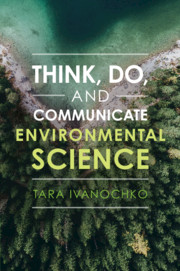Book contents
- Think, Do, and Communicate Environmental Science
- Think, Do, and Communicate Environmental Science
- Copyright page
- Contents
- Prologue
- Acknowledgements
- Introduction
- Part I Thinking Environmental Science
- Chapter 1
- Chapter 2
- Chapter 3
- Chapter 4
- Part II Doing Environmental Science
- Part III Communicating Environmental Science
- Epilogue
- Appendix: Working in Excel
- Glossary
- Index
- References
Chapter 1
from Part I - Thinking Environmental Science
Published online by Cambridge University Press: 23 April 2021
- Think, Do, and Communicate Environmental Science
- Think, Do, and Communicate Environmental Science
- Copyright page
- Contents
- Prologue
- Acknowledgements
- Introduction
- Part I Thinking Environmental Science
- Chapter 1
- Chapter 2
- Chapter 3
- Chapter 4
- Part II Doing Environmental Science
- Part III Communicating Environmental Science
- Epilogue
- Appendix: Working in Excel
- Glossary
- Index
- References
Summary
The management and conservation of the world’s oceans require synthesis of spatial data on the distribution and intensity of human activities and the overlap of their impacts on marine ecosystems. We developed an ecosystem-specific, multiscale spatial model to synthesize 17 global data sets of anthropogenic drivers of ecological change for 20 marine ecosystems. Our analysis indicates that no area is unaffected by human influence and that a large fraction (41%) is strongly affected by multiple drivers. However, large areas of relatively little human impact remain, particularly near the poles. The analytical process and resulting maps provide flexible tools for regional and global efforts to allocate conservation resources; to implement ecosystem-based management; and to inform marine spatial planning, education, and basic research.
Information
- Type
- Chapter
- Information
- Think, Do, and Communicate Environmental Science , pp. 9 - 20Publisher: Cambridge University PressPrint publication year: 2021
